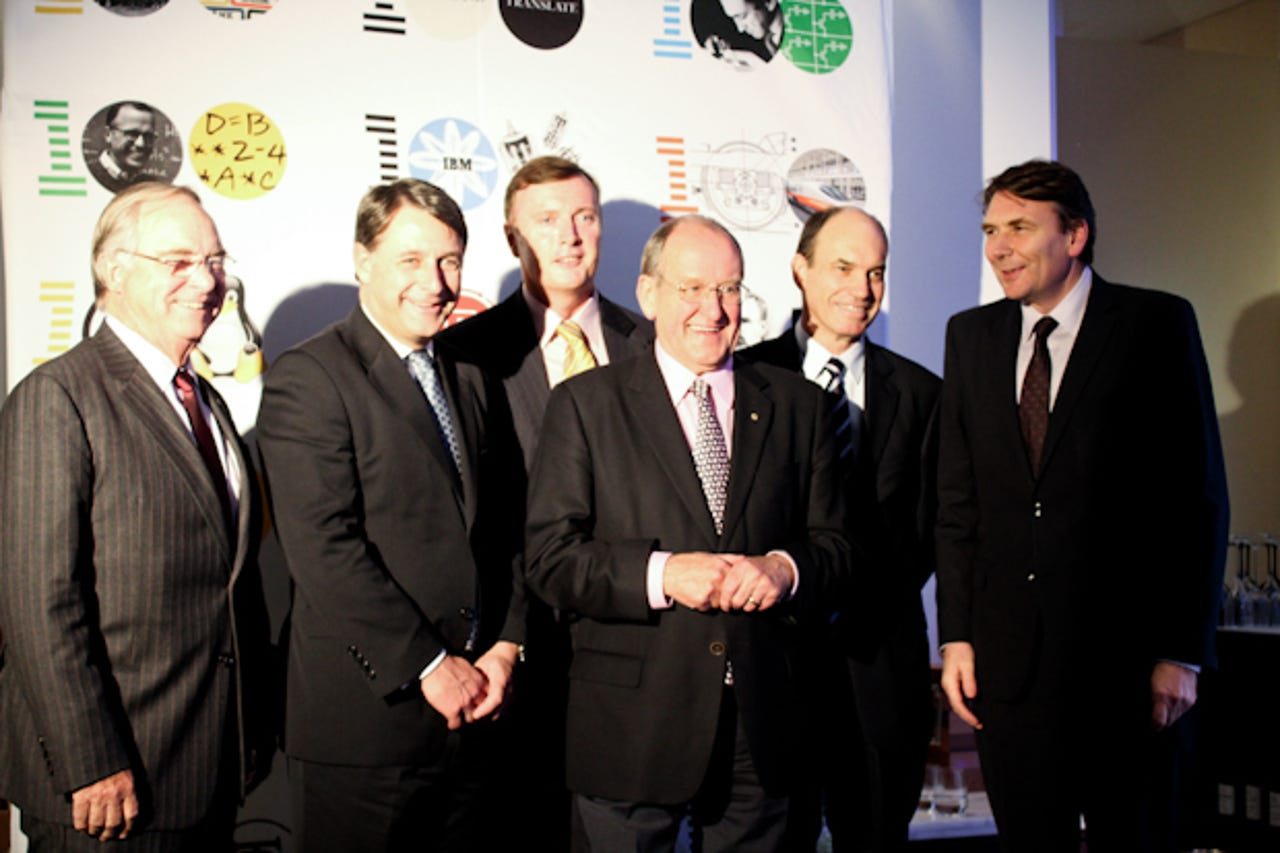CEOs reflect on 100 years of IBM: photos


(Credit: Luke Hopewell/ZDNet Australia)
IBM Australia's super six.
(Credit: Luke Hopewell/ZDNet Australia)
Brian Finn
Brian Finn spent 35 years in IBM, and headed up the company between 1980 and 1993.
Finn said that one of his greatest successes was making IBM Australia a recognisable brand, and winning a number of contracts in the banking industry following its deregulation.
"Nobody believed that IBM would be selected by all six of [the banks] to be the preeminent supplier [of technology], and that was a wonderful thing to have happen," he added.
IBM doubled its revenues in a decade under Finn, but the executive said that the company's dream run quickly came to a standstill in the recession of the early 1990s, which he likened to "having a near-death experience" for IBM. The company lost almost half of its staff due to the hard times.
(Credit: Luke Hopewell/ZDNet Australia)
Bob Savage
Bob Savage took the reins of IBM in 1996 when IBM was restructuring itself into a services and technology business. Savage, like Finn, spent 35 years in the business, and joined when IBM was still offering technology management services.
Savage said that he was dragged kicking and screaming every step of the way back to Australia to manage IBM, having loved his position overseas with IBM in Hong Kong.
"The move back into services ... fundamentally changed the whole nature of our business. We went from being a supplier of hardware and software to somebody who was embedded in the client. We shifted from thinking about how much people spend on hardware and software to how much they spend on their whole operation."
(Credit: Luke Hopewell/ZDNet Australia)
David Thodey
David Thodey, the current CEO of Telstra, spent 22 years with IBM, working there from the 1990s into the new millennium.
Thodey said that his time with the company taught him how good staff can shape the way that a company deals with its customers — a lesson that's been applied in Telstra during the development and execution of Project New.
"The thing that really has stayed with me from my time at IBM has been the culture and the values that the company has that somehow became a part of who I was and who I believed in. Respect for the individual ... and also a commitment to customer service, which is very relevant to Telstra right now. That's what's really stayed with me," Thodey said.
Thodey joked, however, that while IBM had taught him how to deal with challenges in a business, it hadn't prepared him for "government challenges".
(Credit: Luke Hopewell/ZDNet Australia)
Philip Bullock
Philip Bullock spent five years in IBM Australia's top job between 2000 and 2005, shaking up the company by participating in the sell-off of its PC business, and acquiring the consulting arm of PricewaterhouseCoopers.
"[The PricewaterhouseCoopers] acquisition was maybe one of the most significant decisions in the last decade at least. We really acquired a whole access to a new market we didn't have before, and we acquired a whole new talent pool," he said.
Little did Bullock know, but the PricewaterhouseCoopers acquisition also brought with it Andrew Stevens, who would go on to lead the company six years after his departure.
Bullock said that the acquisition of PricewaterhouseCoopers led to yet another cultural change within IBM, similar to the shift in values that the company underwent after Bob Savage guided the company back into a services business.
(Credit: Luke Hopewell/ZDNet Australia)
Glen Boreham
Glen Boreham took over from Philip Bullock in 2006 and, under his reign, IBM adopted its Smarter Planet mantra.
"For the first time, Smarter Planet wasn't about technology. Technology was almost a secondary issue. This was about a discussion about the way the world worked. Whether it was healthcare, transportation or energy," he said.
"This is about being right in the middle of the way the world works."
Boreham was also a key agent in the decision to set up IBM Australia's research and development centre in Melbourne. He told attendees that getting the facility to be grounded in Australia was tantamount to winning an Olympic bid.
(Credit: Luke Hopewell/ZDNet Australia)
Andrew Stevens
Boreham handed over the reins to IBM Australia's current managing director, Andrew Stevens, in January this year.
Stevens told ZDNet Australia after his appointment that he will continue working towards a smarter planet using IBM technology, with a particular focus on getting into the mining sector as well as healthcare and IT services.
He said, in his opening address, that he expects the next 100 years for IBM to be as challenging as the last.
(Credit: Luke Hopewell/ZDNet Australia)
The six managing directors sit on the IBM panel in Sydney.